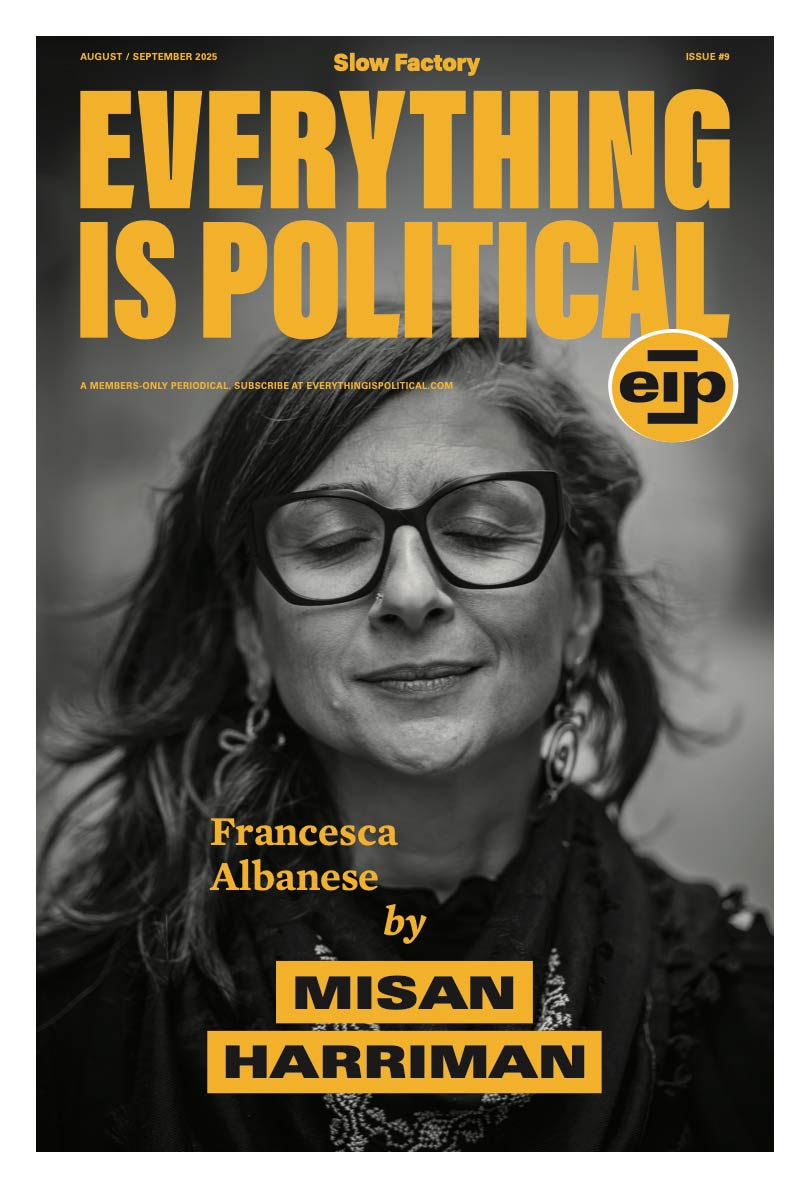Digital & Print Membership
Yearly + Receive 8 free printed back issues
$420 Annually
Monthly + Receive 3 free printed back issues
$40 Monthly
The Art of Witnessing
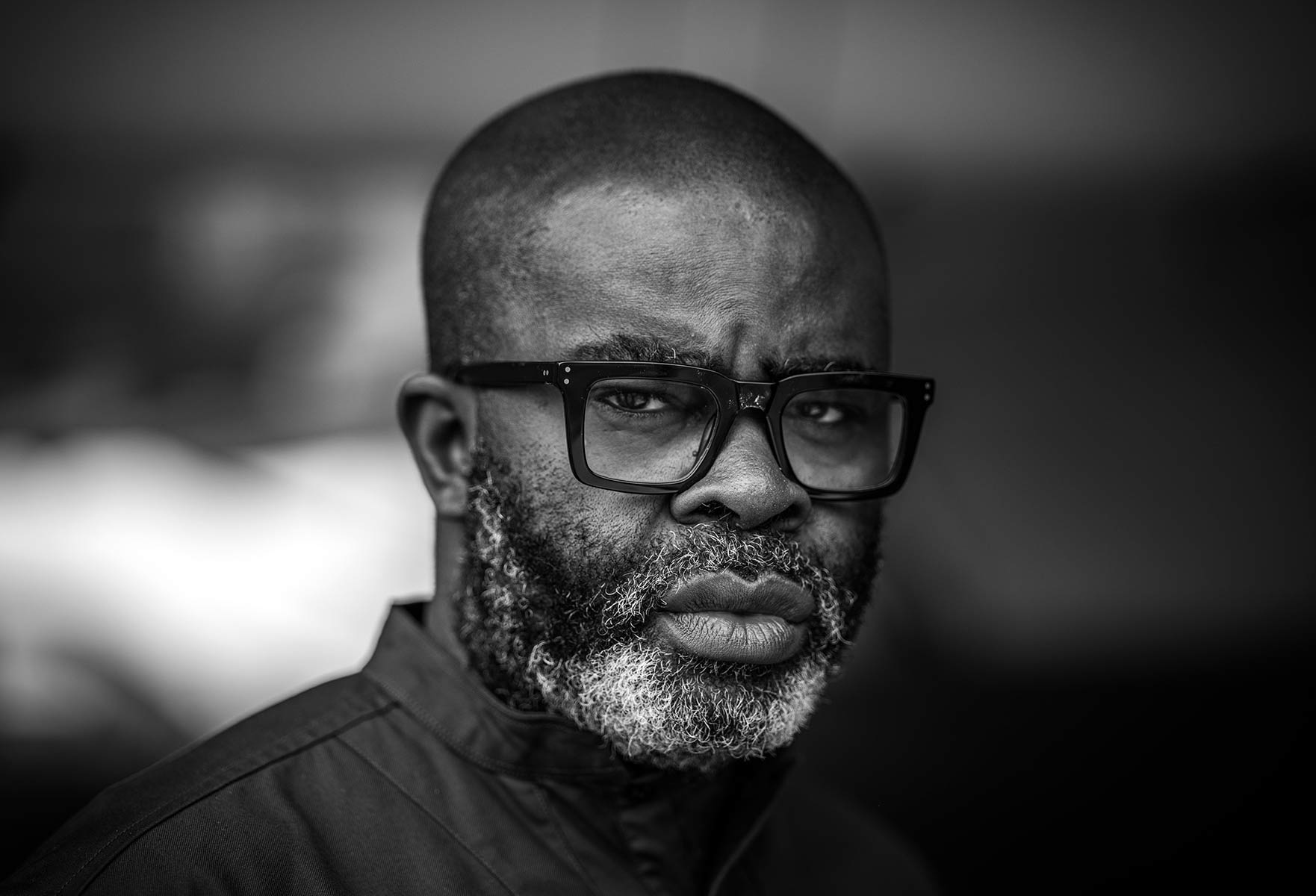
CÉLINE: I came across your work as a fashion photographer, and I want to talk about your trajectory from fashion to politics. Obviously, everything is political. How has the industry responded, both publicly and behind closed doors, to your vocal support for Palestine?
MISAN: I am so disappointed in many industries, but the fashion industry in particular has really surprised me, because so much of its wealth has come out of the Global South, and so much of its value chain is built off the backs of those in the Global South. They have been somewhat vocal about the things that are safe to be vocal about over the years: queer rights, climate, and Black Lives Matter. However, I’ve never seen such silence over Palestine, across the board. I can’t think of a big fashion influencer who has made a very strong statement on Palestine at all in the last two years, at least in film and music. We can pick a handful, but I’m just thinking of a fashion icon, a big, big name, whether they’re a model, fashion designer, or fashion editor; I can’t think of one.
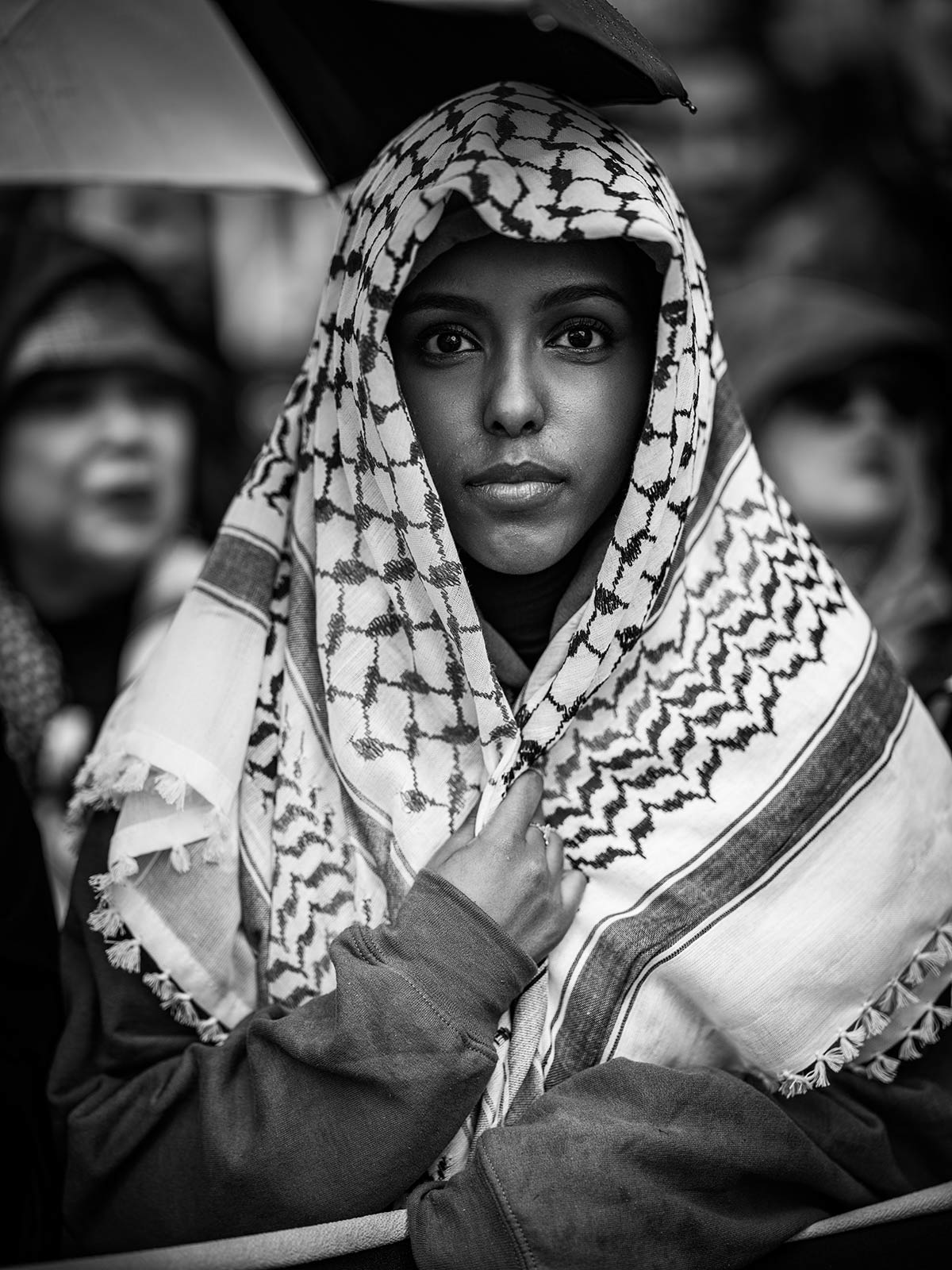
My life was changed by shooting a Vogue cover. I cannot deny that. I was ushered into that world without necessarily asking for it. It just happened. And once I got into that world, I realized very quickly that I was a very different character. You only have to go to a few of the parties and meet some of the characters to realize that, beneath the surface, there is not much there. “I must be a mermaid, Rango. I have no fear of depths and a great fear of shallow living.” I love that Anais Nin quote so much.
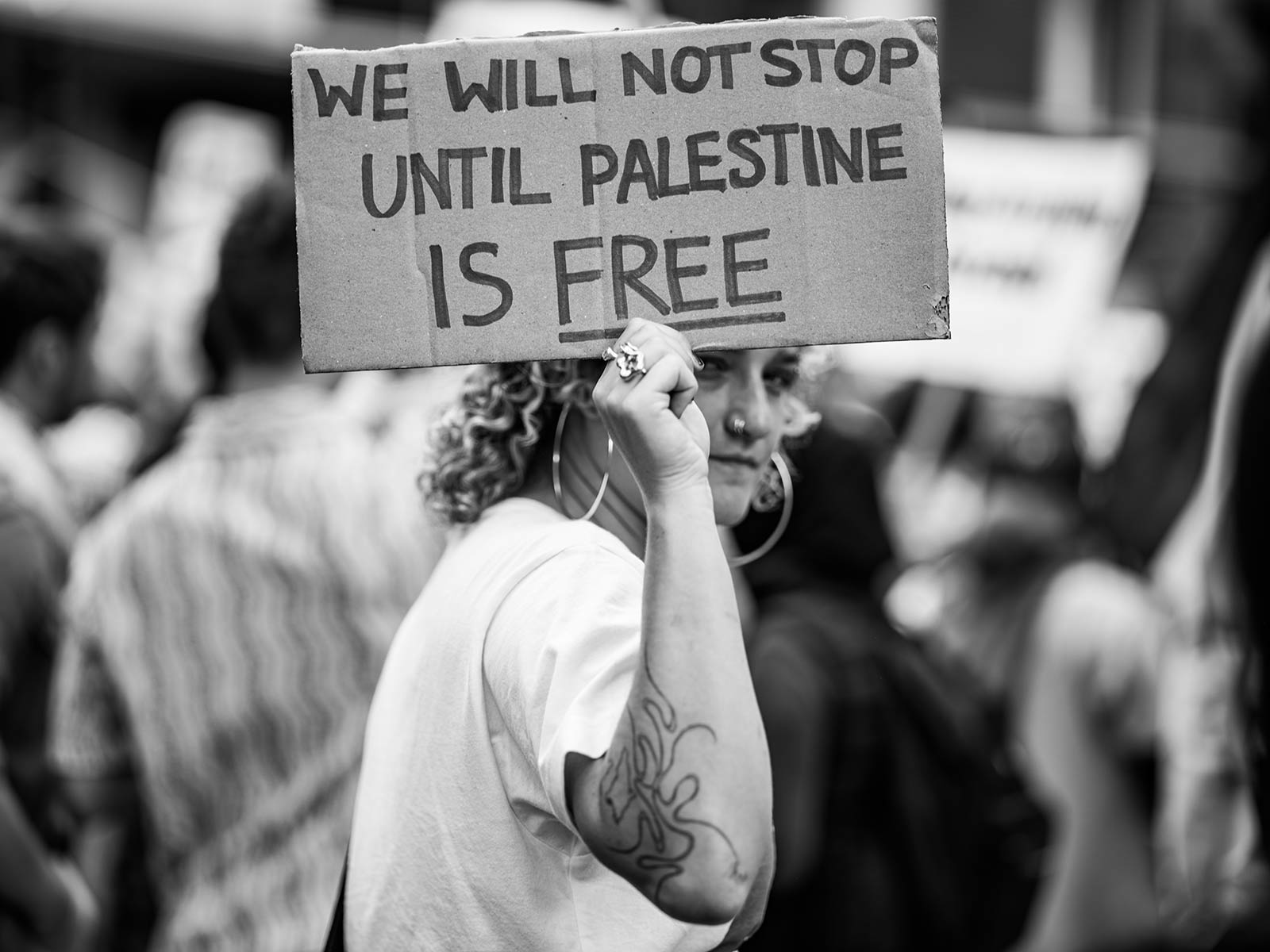
It’s been really sad because for many women, in particular, fashion has been a singular pillar to hold on to, a way to resist, to thrive, to show who they are against all odds. And for that not to enter this moment we’re in now is deeply disappointing. Fashion has co-opted our trauma. There was the Met Gala this year, highlighting Black dandyism. Anna Wintour is a genius in marketing, and she understands what culture and the zeitgeist is. But there’s a bigger question about how Black culture has been wrapped around white supremacy for too long, whether it’s in sports, music, or film. We have to ask ourselves whether Black excellence hasn’t become part of an imperial structure. I DMed some of my brothers who were involved in this, saying that if they were going to do it, then they should make sure that they have a moment at the Met on the red carpet for the children of Congo, the children of Sudan, and the children of Gaza. I said that if they did that, I would fly to New York with my camera and shoot it. Some of the proceeds would go to medical aid for Palestine. I didn’t hear back from a damn person.
In Kendrick’s performance during the Super Bowl, it wasn’t Kendrick who gave permission to that dancer to run with the Sudanese and Palestinian flags, yet the whole show was using revolutionary imagery. It was the most watched show in the world, and it’s literally a show about revolution, and yet we’re living through our Vietnam. You used to see people like Marlon Brando and Charlton Heston, who were complicated white men, march in Washington with MLK and other black civil rights leaders. We don’t have that kind of intersectionality at all right now. We don’t have a Palestine Liberation Movement in the way I wish we had. The irony is that the same demons are at the top of it all: imperialism, extractive capitalism, overt, historical and current white supremacy.
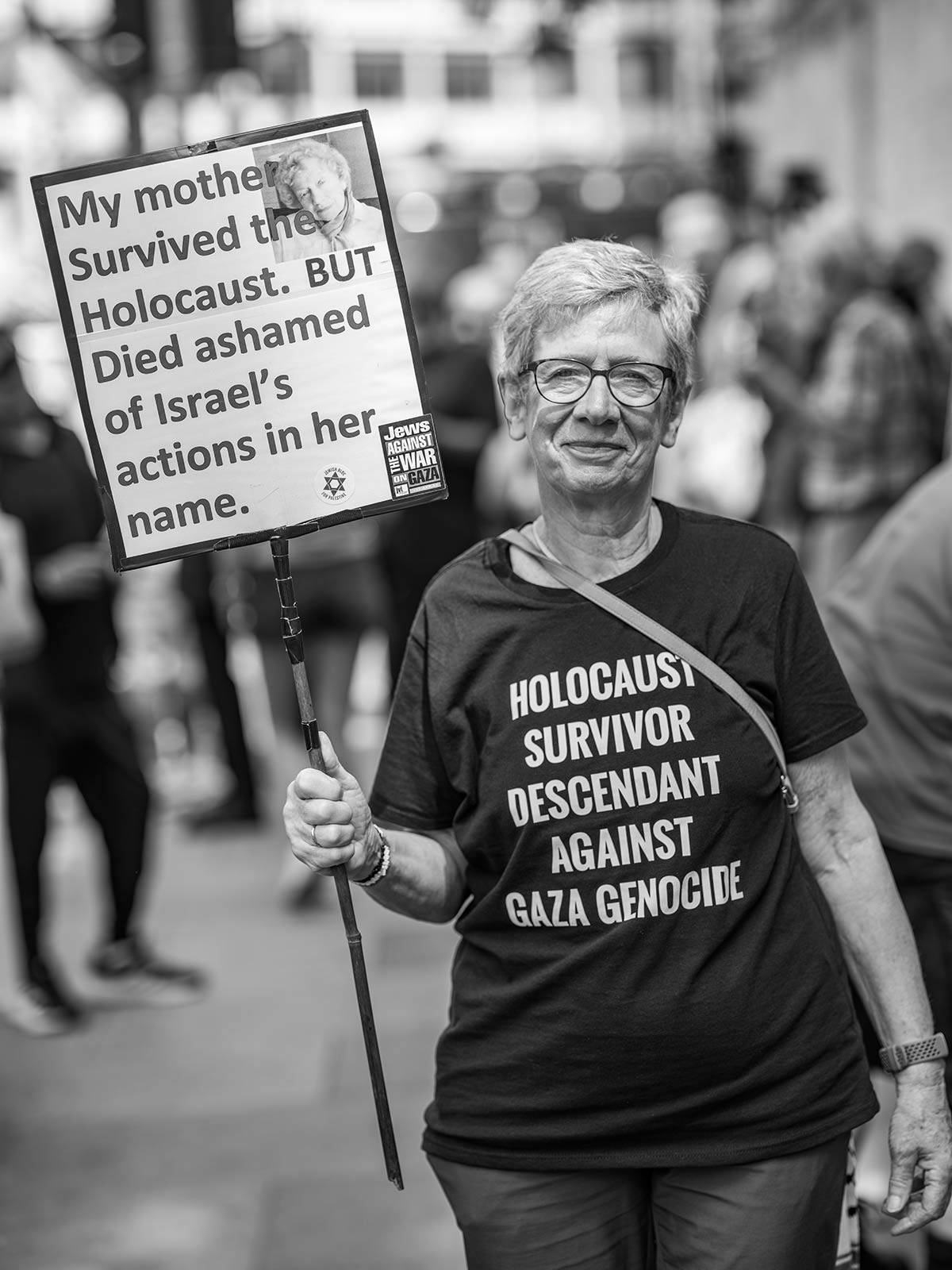
CÉLINE: How did you enter the conversation on Palestine? Because you’ve been a powerful voice in documenting uprisings and moments of truth. What was the turning point for you, personally, that led you to speak out about Palestine, despite all the risks for your career and your reputation? It doesn’t come without stigma. What was it for you that was a turning point?
MISAN: I’ve always had Palestinian friends. I’ve always had Arab friends. Muslim and Arab people are part of my soul. Our shared collective traumas are so similar in so many ways. I’ve known human beings that the world has told me are terrorists. I went to boarding school, and the Black boys and the Arab boys… we survived together. But there’s also the thing that (before October 7) really made me think… It wasn’t just the assassination of Shireen Abu Akleh (a Palestinian-American journalist who was killed by Israeli forces in May of 2022). That was bad enough, but what changed me, almost at a molecular level, were the images of her funeral. When I saw the IDF soldiers beating up her family members whilst they were holding her coffin. For me, that was it. You don’t need to explain or debate anything else. I was like, okay, I need to do more.
How did we get to the place where the security apparatus for a nation that calls itself the only democracy in the Middle East can beat up family members at a funeral of their sister, a woman who was assassinated in cold blood just for trying to make sure the truth stayed in the room? I read everything I could. Also, I have a family connection with apartheid. My father had one brother… the two Harriman men were very well known in Nigeria. One went to Oxford, one went to Cambridge; it’s kind of like the Cain and Abel story in many ways. Both were brilliant men. My dad became this huge industrialist, but my father’s brother became the first chairman of the United Nations Special Committee Against Apartheid. If you Google Ambassador Leslie Harriman, a picture of him smoking a cigar in traditional Nigerian dress with Muhammad Ali in the UN pops up. Activism, working against apartheid, is part of my family heritage.
And then there’s a small detail of me being born in Nigeria, and my parents being born in Nigeria, which was an occupied country by the same folks that created this mess in the first place. Nigeria, which is now Africa’s most populous country, was named by Flora Shaw, Baroness Lugard, a white lady. Imagine the power of that. One person named us, like my children named their teddy bears. I have some stock in the game. How the hell could I see the West Bank and Gaza and not recognize what was being done to them from my own heritage and lived experience of the colonial mess that all of us were born into? I read about the Sykes-Picot Agreement (a 1916 secret treaty between the United Kingdom and France, with assent from Russia and Italy, to define their mutually agreed spheres of influence and control in an eventual partition of the Ottoman Empire – Wikipedia), and I realized what was done to the Arab people.
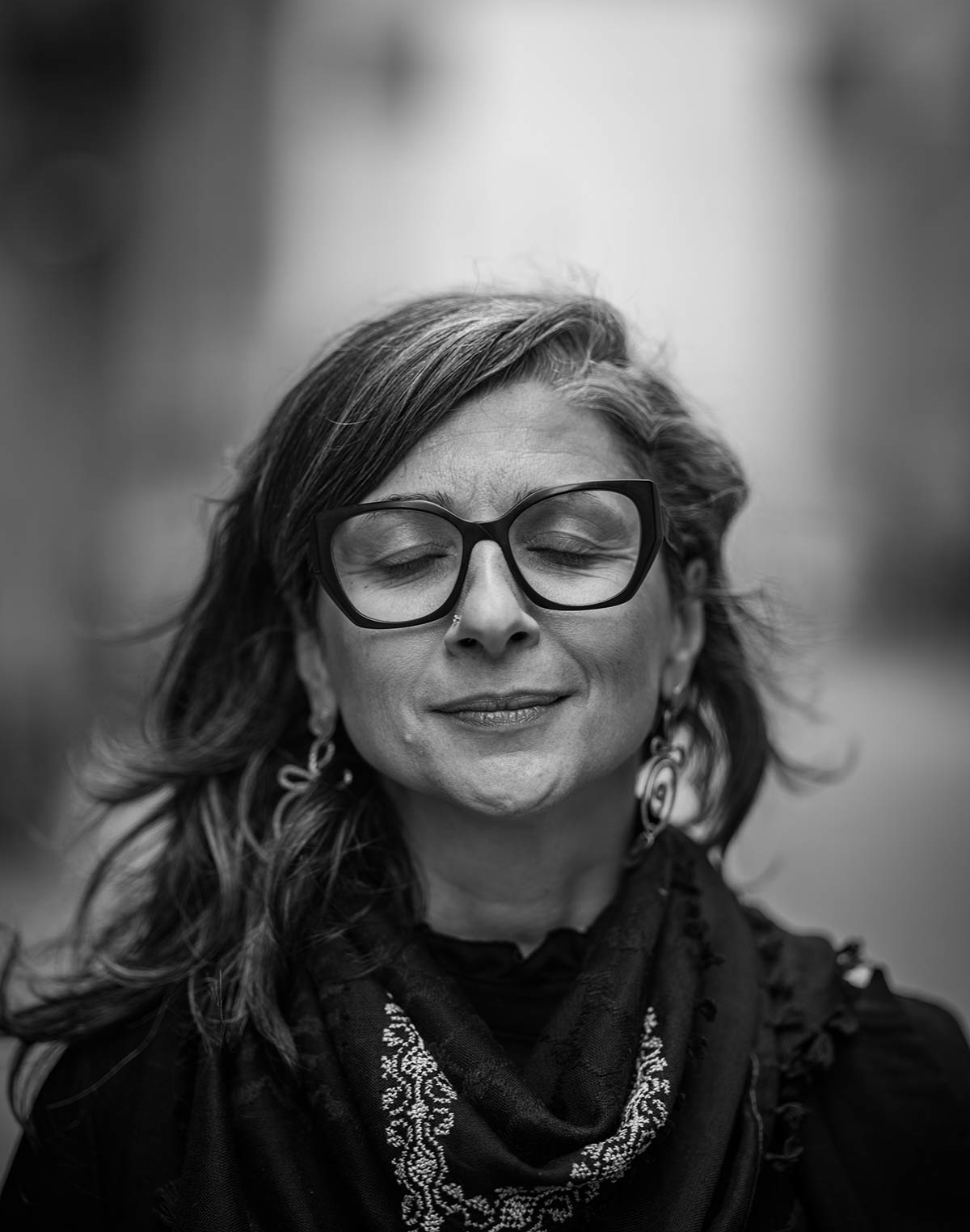
CÉLINE: Historically, there is solidarity between Black and Arab liberation movements, African and Middle Eastern solidarity. For instance, after Malcolm X traveled to Palestine, the struggle for Black liberation in America became grounded and rooted in liberation for Palestinians. Often this discourse is erased when we talk about Malcolm X. Lisa al Hassan who is Syrian and one of our fellows and advisors at slow factory, did her PhD on Malcolm X and his connection to Palestine and all the work he did to legitimize the solidarity between Black Americans and Palestinians… there is a larger solidarity between Black and Arab folks internationally. And you just pointed to it so perfectly…
MISAN: There is a community in Palestine of Nigerians… Nigerian families that have been there for over 100 years. People forget that there are black Palestinians. No one in the Western media wants Black folk in the Western world to understand that. People find that to be a very dangerous thing for obvious reasons. Palestine has taken off the veil of what the world is. There is the madness of the colonial settler project all around the West Bank. There is the ridiculous categorization of Palestinians as Arab Israelis. What’s happening in Palestine is making mothers in Ohio wake up to the fact that the US military machine isn’t the good guy. Something about this moment has lifted the veil not just on imperialism and the for-profit war machine, but on the fact that many of us were like spectators in the Coliseum, watching Gladiators fight to the death during the Roman Empire, not realizing that everything was falling apart as we were being entertained. Russell Crowe’s character in Gladiator asks, “Are you not entertained?”
We’ve been dumbed down by going to Taylor Swift and Beyoncé concerts. We have been dumbed down by being hyper-focused on tribalization, on whether you support Arsenal, or you’re a Chicago Bulls fan; we have been dumbed down by the post 9/11 racism. The dehumanization of Black and Brown identities through entertainment is effective. Claire Danes running around the Middle East in Homeland, or a myriad of different films where the baddie, an Arab man, is either a rich fool or a terrorist. He cannot be a philosopher or a teacher or a lover or a father or just a deeply complicated, nuanced, imperfect soul who deserves a right to thrive. The Arab woman has been reduced to some sort of terrorist bride. I have bathed in the history of our collective past in a way that few in my position have. There’s a reason why I’m not asked to be interviewed on big shows…
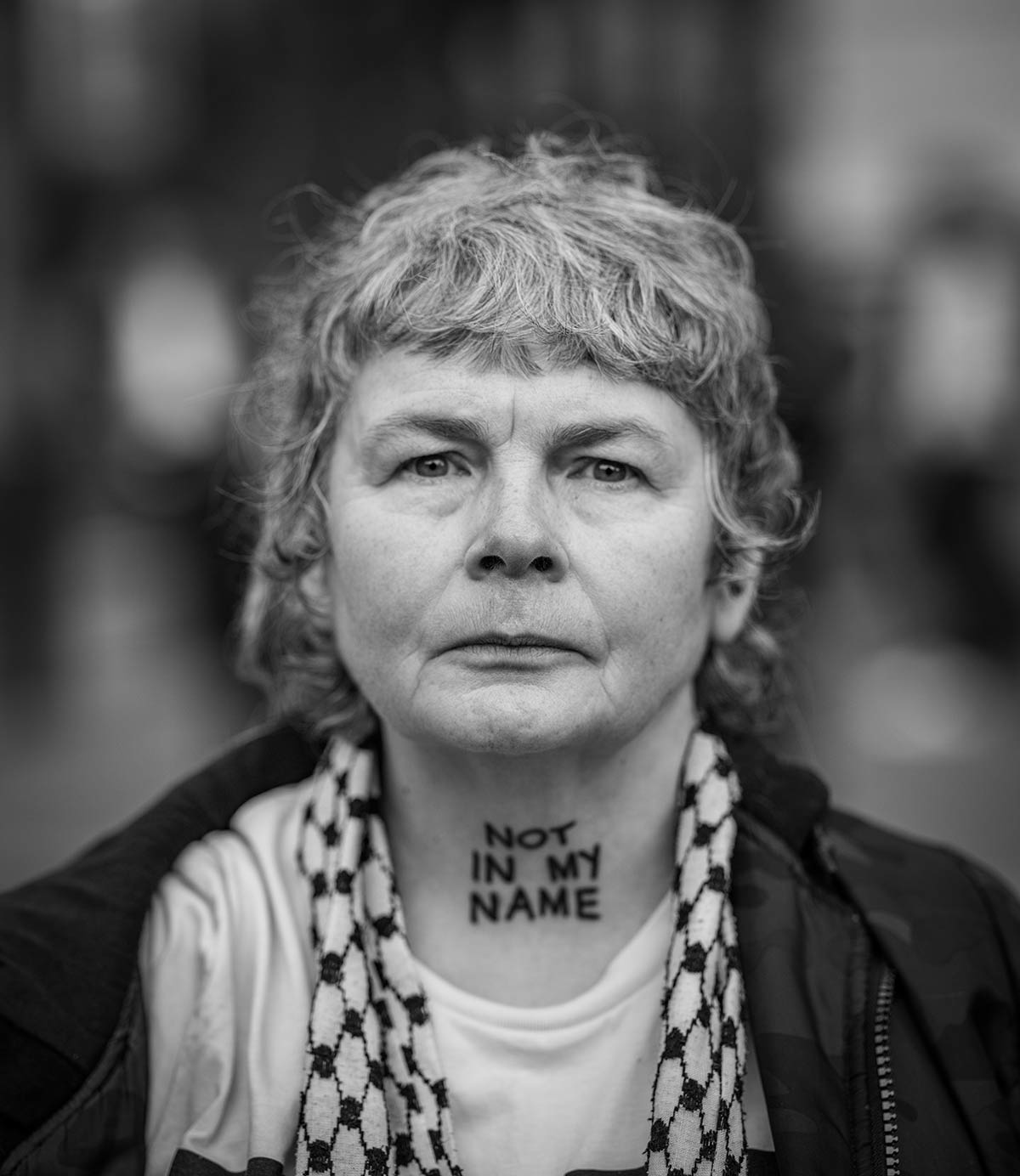
CÉLINE: I didn’t know the depth of your understanding of all this. I’m delighted. What an alignment. This is exactly why we created this platform. We are building collective liberation with our work through our ethnic struggles. It’s not an isolated struggle.
MISAN: We’re dealing with a very well-organized machine… Zionism is part of a bigger, and in many ways uglier machine, which is capitalism. That’s what’s making this world so wounded, whether we’re talking about climate or marginalized groups like the Trans community. I can understand how many people are scared to resist because the cost is usually to their livelihood, and that’s what’s so dangerous about this for artists. Many artists are with us, maybe not in the same way I am… they haven’t gone down your rabbit hole or mine, but they recognize that children shouldn’t be treated in this way. They recognize that apartheid and settler colonialism are wrong, but they also have a team of publicists and managers who are telling them that they will never work again. I think of Omar El Akkad’s book title, One Day, Everyone Will Have Always Been Against This.
I’m not here to judge; if anything, I’m here to say, hold my hand, and we’ll figure out how to build a new circular economy to support all of us. I was talking to Malak Mattar (a great Palestinian artist), and I’m just like, it’s crazy that there isn’t a fund designed to make sure poets, dancers, filmmakers, photographers, all of us, don’t second guess, as we charge ahead, using our art as one of the great soft powers of resistance. And she’s like, but that’s how they win, right? There’s so much Arab wealth, Global South wealth… If one percent of it was used to make sure art survives… we are fighting tooth and nail to keep the lights on, because 99% of the real money is in Blackrock and mega hedge funds. There’s a reason why someone like Zuckerberg can come up with an idea, a good idea.
How many Arab women have been invested in on the tech side of things? I know investment in Black women is next to zero. I’m pretty sure it’s the same for Arab women. Most founders of the big unicorns that are destroying the world right now are men. In fact, almost all of them, whether it’s Elon Musk or Jeff Zucker, former President of CNN, are men. I think that’s something that we really must look at. I do not believe women are perfect, but there is something within matriarchy that hasn’t got that scorched earth button. I did some research on mass shootings in America, and I think there has only been one woman who has committed a mass shooting in almost 100 years, which is crazy, because women are abused. Women have crazy dads who give them a machine gun for their 16th birthday, but there’s something that stops a woman from walking into a school and just spraying babies to death. I then went further and looked at women on death row, and most of the women on death row had done awful things, but they were singular in nature. Poisoning your husband because he fell in love with someone else, that kind of thing. They weren’t massacring children. Since that’s the case, don’t you think that maybe we should have women in the room when it comes to military decisions, when it comes to how much we spend on defense, when it comes to our health care, when it comes to climate?
Most of the horrible decisions that have been made, like dropping nuclear bombs, have been made by men. I hate the sexist, misogynistic retort, “What about Margaret Thatcher?” She had to become the machine to get to where she got to. She had to turn herself into part of the patriarchy. In order to be in a position of power, she had to become part of the same machine that is destroying all of us.
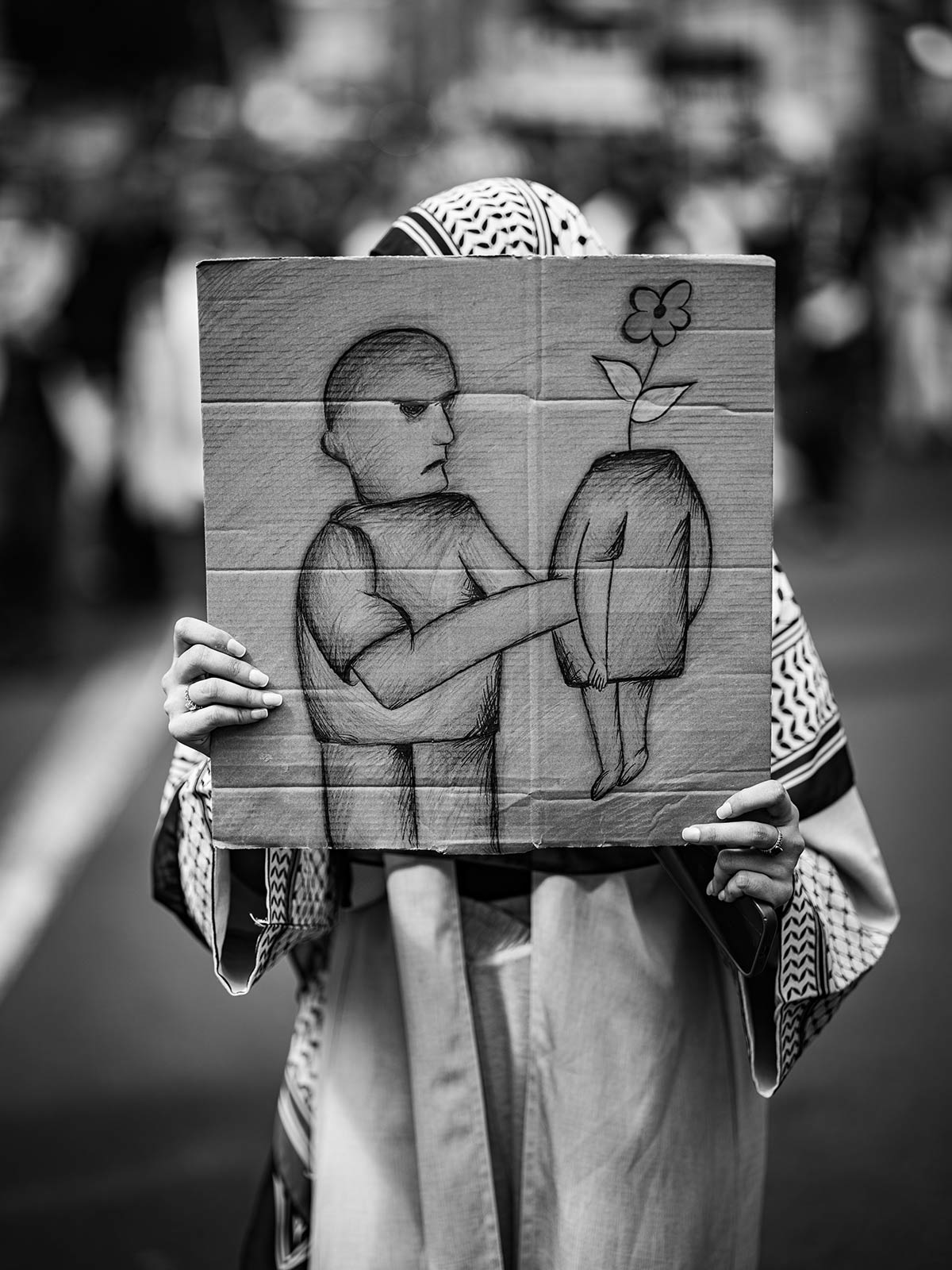
CÉLINE: My philosophy teacher in Lebanon said, “Oppressive systems are afraid of two things, love and ideas, because both of these things open up the door to possibilities. It’s not the system. It’s just a system. And so when you say that artists like Malak Mattar and Slow Factory and creatives should be supported, you are literally calling for disruption. True disruption comes from the arts, from freedom of expression. True creativity is feared; that is why PBS is being defunded and Colbert is being canceled. We’re seeing all the things at the intersection of education and entertainment being taken down. Why is that?
MISAN: It’s the greatest weapon we have. It’s the only magic that Homo Sapiens have. Otherwise, we are the same as the primordial soup we came from. It’s what sets us apart from the rest of the natural world and makes us really, really special. I was worried about my show, only because of the crazy, unhinged response people have to anything that humanizes the Palestine Solidarity movement. This is why, for years, artists were arrested and killed, and archives were destroyed. No one has ever come after me for my images of women’s rights and the anti-racist movement. But there’s something about how I’ve managed to shoot Palestinian protests in LA and Johannesburg… At the time of this interview, the show has only been open to the public for five days… but the gallery space has already become a sanctuary. At the opening, a Lebanese lady collapsed and fell into my arms. She looked up at me with red eyes and said, “Now I know what art is.” So many Arab men, Muslim men, walk in and cry, and then I get phone calls from powerful forces who damn near threaten my life and tell me to shut it down.
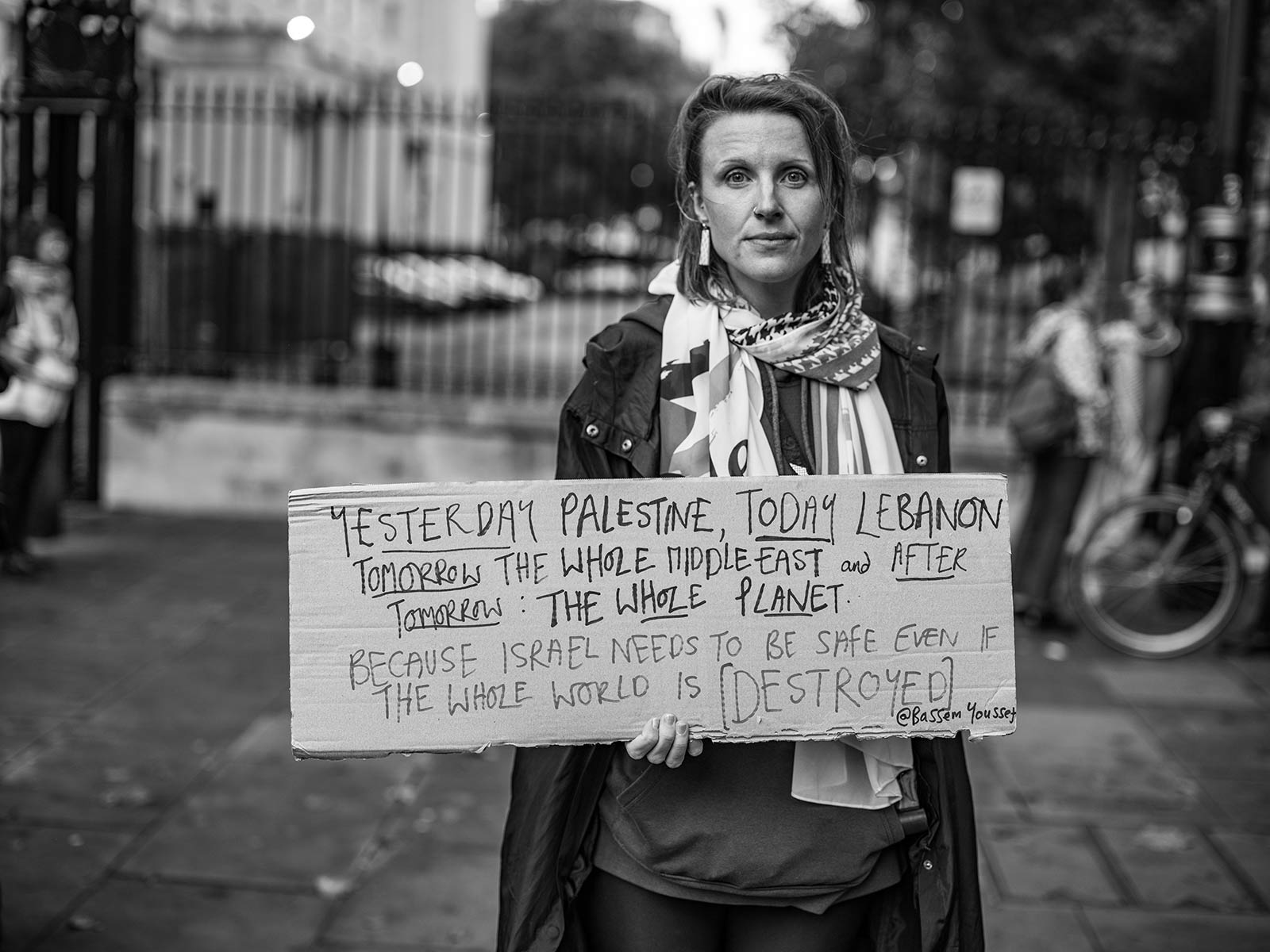
CÉLINE: That’s why we want to print it. That’s why we want it everywhere. That’s why we want to support it.
MISAN: I found a very brave Black-owned gallery to take this on. You know, as well as I do, that this show would never be at the Tate. It would never be at any of the major spaces. Yet, everyone has the subject on their minds. How does that make sense?
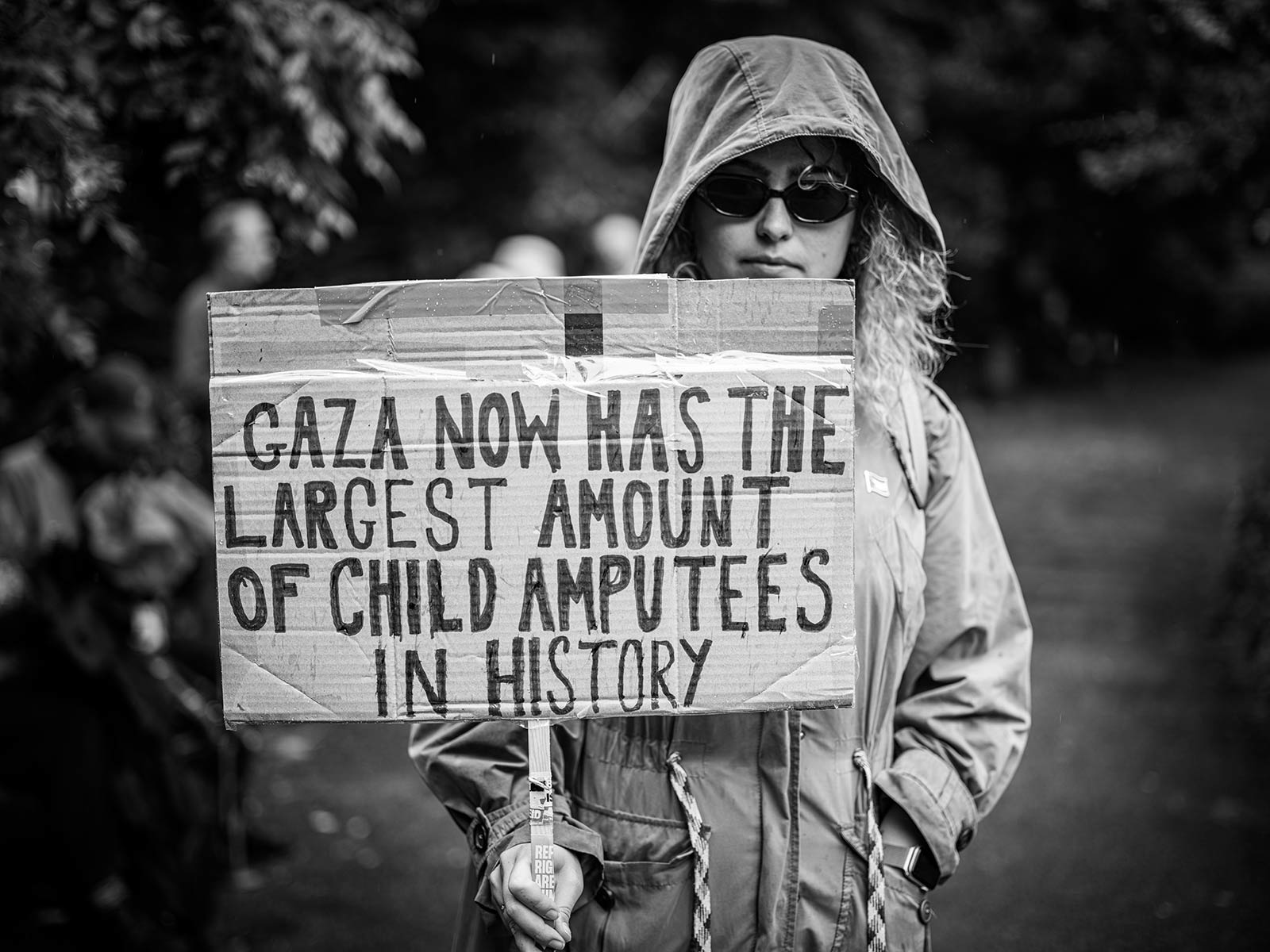
CÉLINE: We have the superpower to bring to life things that are being experienced and ignored, or silenced, or purposefully kept quiet. There is a war on our bodies, on our land, on the Palestinian bodies, on the Sudanese bodies, on the Congolese bodies, on the Asian bodies, on the Tibetan bodies. And, there is a global movement of liberation. Palestine is the soul of that. Because, as you said, what’s happening in Gaza and the worldwide protests in response to the genocide are awakening people. People are seeing pictures of people uprising, of people rising into courage. That’s what this is about. This is about uplifting, showing that there is a door, there is a way, there is a path. That you don’t need to sit in pain. You can do something. What is the ultimate action you wish to inspire through your work?
MISAN: I want people to know that they’re not alone. Nina Simone was asked, “What does freedom mean for you?” And she said two words, “No fear.” I can feel you shaking when you look at my photos… let’s let that vibration become purpose, and let’s keep walking. I hate to bring this up, but we don’t have a choice in terms of the attention economics of our time. What I mean by that is the most followed people in the world are celebrities, sports figures, singers, and actors… The reason I’m behind the scenes doing everything I can to make some of the biggest ones speak is not because I look up to them… I think many of them are false idols, straight up. But human nature is a very interesting thing. And politicians will not make decisions out of their moral compass. But they will make decisions out of vanity, and the court of public opinion. And I’m telling you now, if you had the soccer stars, Cristiano Ronaldo, Lionel Messi, David Beckham, and Mo Salah, the whole Kardashian clan, and Adele come together, week in and week out, demanding our politicians do something, it would make a huge difference…
The public is with us. In the rain yesterday, at the protest in London, we were there in the 1000s… I’m a Save the Children Ambassador for UNICEF, which is the biggest humanitarian agency for children. UNICEF has one job, which is to protect children globally… and yet there are children in a postage stamp-sized place with no airport that is walled in, where they are being shot by snipers, and rotting in incubators… There are Save the Children ambassadors, some of the most famous people in the world, who haven’t said anything. I’m just keeping it real with you. I’m the least famous kind of global ambassador for some of these large organizations. And many people say I’m the most vocal. It’s madness. I am not here to scream at you, “How dare you?” It’s past that. There are too many babies dying. I’m on my fucking knees begging you to say something. But if you don’t want to say something, leave these organizations and get busy living your fabulous life, ignoring the humanity of the children that need you most, but do not stay associated in any way with a children’s charity and say nothing for the children of Gaza, specifically Gaza…
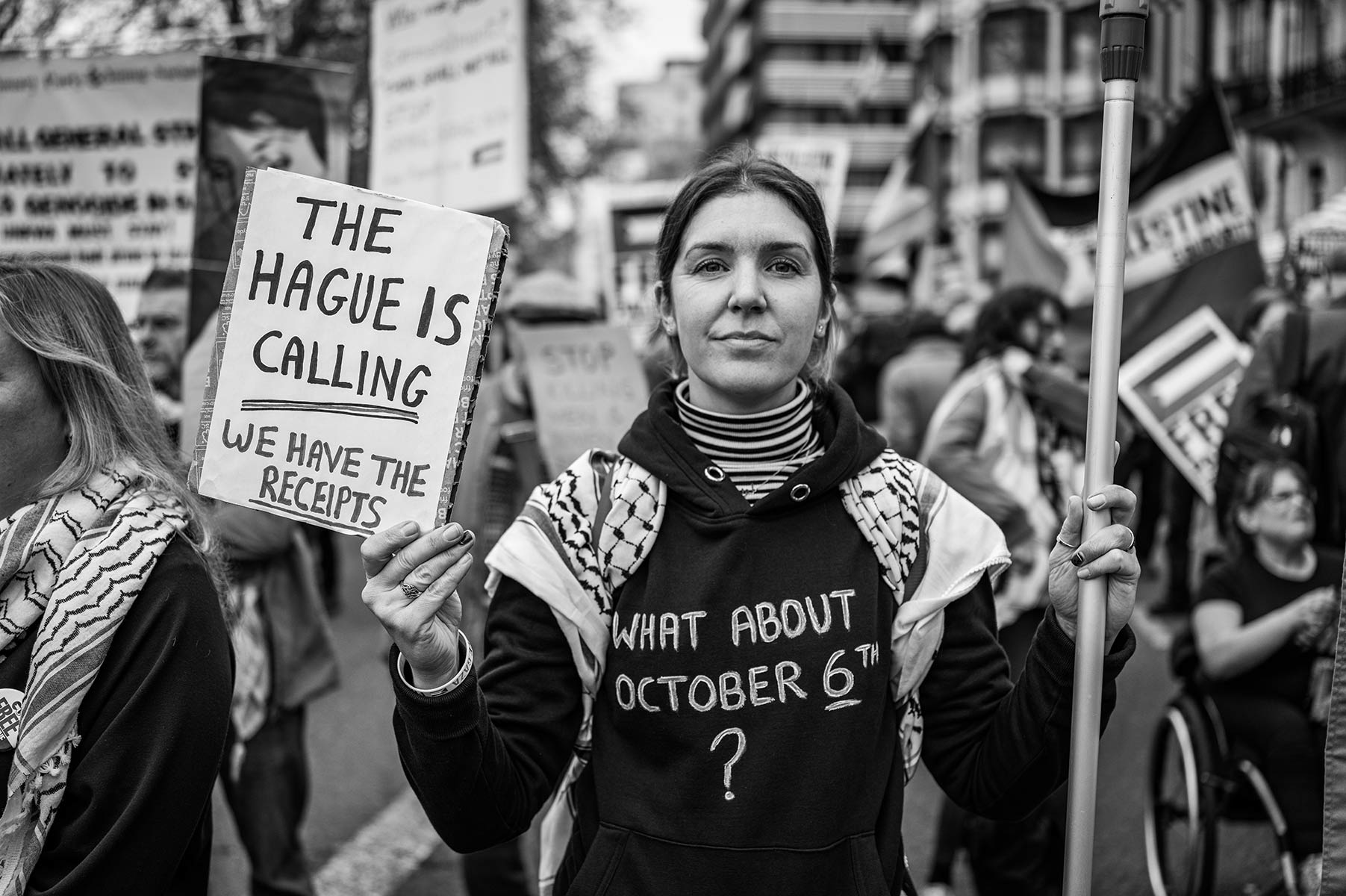
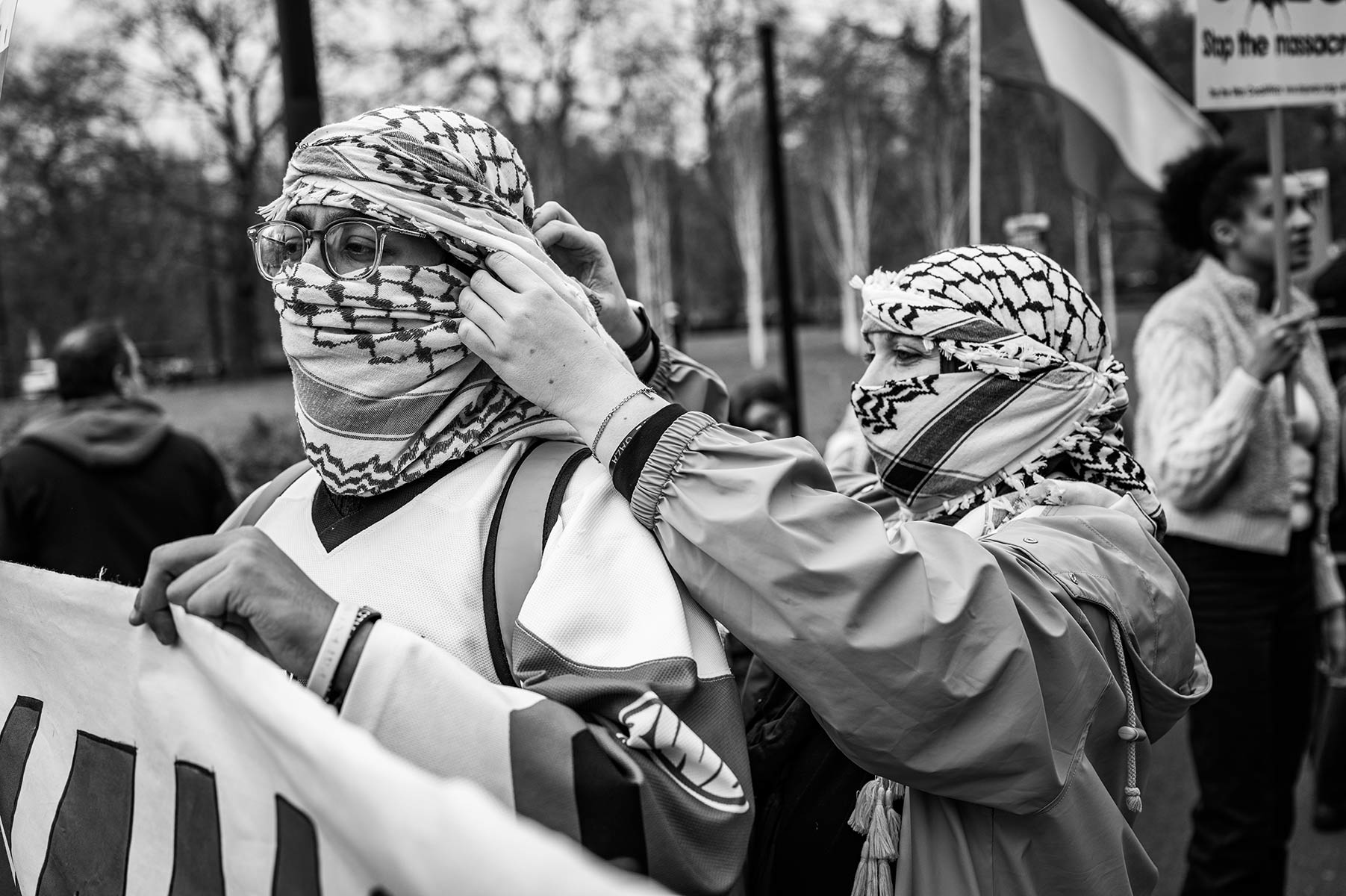
{
"article":
{
"title" : "The Art of Witnessing",
"author" : "Misan Harriman, Céline Semaan",
"category" : "",
"url" : "https://everythingispolitical.com/readings/misan-harriman",
"date" : "2025-09-08 10:11:00 -0400",
"img" : "https://everythingispolitical.com/uploads/Misan_Harriman_2.jpg",
"excerpt" : "",
"content" : "CÉLINE: I came across your work as a fashion photographer, and I want to talk about your trajectory from fashion to politics. Obviously, everything is political. How has the industry responded, both publicly and behind closed doors, to your vocal support for Palestine?MISAN: I am so disappointed in many industries, but the fashion industry in particular has really surprised me, because so much of its wealth has come out of the Global South, and so much of its value chain is built off the backs of those in the Global South. They have been somewhat vocal about the things that are safe to be vocal about over the years: queer rights, climate, and Black Lives Matter. However, I’ve never seen such silence over Palestine, across the board. I can’t think of a big fashion influencer who has made a very strong statement on Palestine at all in the last two years, at least in film and music. We can pick a handful, but I’m just thinking of a fashion icon, a big, big name, whether they’re a model, fashion designer, or fashion editor; I can’t think of one.My life was changed by shooting a Vogue cover. I cannot deny that. I was ushered into that world without necessarily asking for it. It just happened. And once I got into that world, I realized very quickly that I was a very different character. You only have to go to a few of the parties and meet some of the characters to realize that, beneath the surface, there is not much there. “I must be a mermaid, Rango. I have no fear of depths and a great fear of shallow living.” I love that Anais Nin quote so much.It’s been really sad because for many women, in particular, fashion has been a singular pillar to hold on to, a way to resist, to thrive, to show who they are against all odds. And for that not to enter this moment we’re in now is deeply disappointing. Fashion has co-opted our trauma. There was the Met Gala this year, highlighting Black dandyism. Anna Wintour is a genius in marketing, and she understands what culture and the zeitgeist is. But there’s a bigger question about how Black culture has been wrapped around white supremacy for too long, whether it’s in sports, music, or film. We have to ask ourselves whether Black excellence hasn’t become part of an imperial structure. I DMed some of my brothers who were involved in this, saying that if they were going to do it, then they should make sure that they have a moment at the Met on the red carpet for the children of Congo, the children of Sudan, and the children of Gaza. I said that if they did that, I would fly to New York with my camera and shoot it. Some of the proceeds would go to medical aid for Palestine. I didn’t hear back from a damn person.In Kendrick’s performance during the Super Bowl, it wasn’t Kendrick who gave permission to that dancer to run with the Sudanese and Palestinian flags, yet the whole show was using revolutionary imagery. It was the most watched show in the world, and it’s literally a show about revolution, and yet we’re living through our Vietnam. You used to see people like Marlon Brando and Charlton Heston, who were complicated white men, march in Washington with MLK and other black civil rights leaders. We don’t have that kind of intersectionality at all right now. We don’t have a Palestine Liberation Movement in the way I wish we had. The irony is that the same demons are at the top of it all: imperialism, extractive capitalism, overt, historical and current white supremacy.CÉLINE: How did you enter the conversation on Palestine? Because you’ve been a powerful voice in documenting uprisings and moments of truth. What was the turning point for you, personally, that led you to speak out about Palestine, despite all the risks for your career and your reputation? It doesn’t come without stigma. What was it for you that was a turning point?MISAN: I’ve always had Palestinian friends. I’ve always had Arab friends. Muslim and Arab people are part of my soul. Our shared collective traumas are so similar in so many ways. I’ve known human beings that the world has told me are terrorists. I went to boarding school, and the Black boys and the Arab boys… we survived together. But there’s also the thing that (before October 7) really made me think… It wasn’t just the assassination of Shireen Abu Akleh (a Palestinian-American journalist who was killed by Israeli forces in May of 2022). That was bad enough, but what changed me, almost at a molecular level, were the images of her funeral. When I saw the IDF soldiers beating up her family members whilst they were holding her coffin. For me, that was it. You don’t need to explain or debate anything else. I was like, okay, I need to do more.How did we get to the place where the security apparatus for a nation that calls itself the only democracy in the Middle East can beat up family members at a funeral of their sister, a woman who was assassinated in cold blood just for trying to make sure the truth stayed in the room? I read everything I could. Also, I have a family connection with apartheid. My father had one brother… the two Harriman men were very well known in Nigeria. One went to Oxford, one went to Cambridge; it’s kind of like the Cain and Abel story in many ways. Both were brilliant men. My dad became this huge industrialist, but my father’s brother became the first chairman of the United Nations Special Committee Against Apartheid. If you Google Ambassador Leslie Harriman, a picture of him smoking a cigar in traditional Nigerian dress with Muhammad Ali in the UN pops up. Activism, working against apartheid, is part of my family heritage.And then there’s a small detail of me being born in Nigeria, and my parents being born in Nigeria, which was an occupied country by the same folks that created this mess in the first place. Nigeria, which is now Africa’s most populous country, was named by Flora Shaw, Baroness Lugard, a white lady. Imagine the power of that. One person named us, like my children named their teddy bears. I have some stock in the game. How the hell could I see the West Bank and Gaza and not recognize what was being done to them from my own heritage and lived experience of the colonial mess that all of us were born into? I read about the Sykes-Picot Agreement (a 1916 secret treaty between the United Kingdom and France, with assent from Russia and Italy, to define their mutually agreed spheres of influence and control in an eventual partition of the Ottoman Empire – Wikipedia), and I realized what was done to the Arab people.CÉLINE: Historically, there is solidarity between Black and Arab liberation movements, African and Middle Eastern solidarity. For instance, after Malcolm X traveled to Palestine, the struggle for Black liberation in America became grounded and rooted in liberation for Palestinians. Often this discourse is erased when we talk about Malcolm X. Lisa al Hassan who is Syrian and one of our fellows and advisors at slow factory, did her PhD on Malcolm X and his connection to Palestine and all the work he did to legitimize the solidarity between Black Americans and Palestinians… there is a larger solidarity between Black and Arab folks internationally. And you just pointed to it so perfectly…MISAN: There is a community in Palestine of Nigerians… Nigerian families that have been there for over 100 years. People forget that there are black Palestinians. No one in the Western media wants Black folk in the Western world to understand that. People find that to be a very dangerous thing for obvious reasons. Palestine has taken off the veil of what the world is. There is the madness of the colonial settler project all around the West Bank. There is the ridiculous categorization of Palestinians as Arab Israelis. What’s happening in Palestine is making mothers in Ohio wake up to the fact that the US military machine isn’t the good guy. Something about this moment has lifted the veil not just on imperialism and the for-profit war machine, but on the fact that many of us were like spectators in the Coliseum, watching Gladiators fight to the death during the Roman Empire, not realizing that everything was falling apart as we were being entertained. Russell Crowe’s character in Gladiator asks, “Are you not entertained?”We’ve been dumbed down by going to Taylor Swift and Beyoncé concerts. We have been dumbed down by being hyper-focused on tribalization, on whether you support Arsenal, or you’re a Chicago Bulls fan; we have been dumbed down by the post 9/11 racism. The dehumanization of Black and Brown identities through entertainment is effective. Claire Danes running around the Middle East in Homeland, or a myriad of different films where the baddie, an Arab man, is either a rich fool or a terrorist. He cannot be a philosopher or a teacher or a lover or a father or just a deeply complicated, nuanced, imperfect soul who deserves a right to thrive. The Arab woman has been reduced to some sort of terrorist bride. I have bathed in the history of our collective past in a way that few in my position have. There’s a reason why I’m not asked to be interviewed on big shows…CÉLINE: I didn’t know the depth of your understanding of all this. I’m delighted. What an alignment. This is exactly why we created this platform. We are building collective liberation with our work through our ethnic struggles. It’s not an isolated struggle.MISAN: We’re dealing with a very well-organized machine… Zionism is part of a bigger, and in many ways uglier machine, which is capitalism. That’s what’s making this world so wounded, whether we’re talking about climate or marginalized groups like the Trans community. I can understand how many people are scared to resist because the cost is usually to their livelihood, and that’s what’s so dangerous about this for artists. Many artists are with us, maybe not in the same way I am… they haven’t gone down your rabbit hole or mine, but they recognize that children shouldn’t be treated in this way. They recognize that apartheid and settler colonialism are wrong, but they also have a team of publicists and managers who are telling them that they will never work again. I think of Omar El Akkad’s book title, One Day, Everyone Will Have Always Been Against This.I’m not here to judge; if anything, I’m here to say, hold my hand, and we’ll figure out how to build a new circular economy to support all of us. I was talking to Malak Mattar (a great Palestinian artist), and I’m just like, it’s crazy that there isn’t a fund designed to make sure poets, dancers, filmmakers, photographers, all of us, don’t second guess, as we charge ahead, using our art as one of the great soft powers of resistance. And she’s like, but that’s how they win, right? There’s so much Arab wealth, Global South wealth… If one percent of it was used to make sure art survives… we are fighting tooth and nail to keep the lights on, because 99% of the real money is in Blackrock and mega hedge funds. There’s a reason why someone like Zuckerberg can come up with an idea, a good idea.How many Arab women have been invested in on the tech side of things? I know investment in Black women is next to zero. I’m pretty sure it’s the same for Arab women. Most founders of the big unicorns that are destroying the world right now are men. In fact, almost all of them, whether it’s Elon Musk or Jeff Zucker, former President of CNN, are men. I think that’s something that we really must look at. I do not believe women are perfect, but there is something within matriarchy that hasn’t got that scorched earth button. I did some research on mass shootings in America, and I think there has only been one woman who has committed a mass shooting in almost 100 years, which is crazy, because women are abused. Women have crazy dads who give them a machine gun for their 16th birthday, but there’s something that stops a woman from walking into a school and just spraying babies to death. I then went further and looked at women on death row, and most of the women on death row had done awful things, but they were singular in nature. Poisoning your husband because he fell in love with someone else, that kind of thing. They weren’t massacring children. Since that’s the case, don’t you think that maybe we should have women in the room when it comes to military decisions, when it comes to how much we spend on defense, when it comes to our health care, when it comes to climate?Most of the horrible decisions that have been made, like dropping nuclear bombs, have been made by men. I hate the sexist, misogynistic retort, “What about Margaret Thatcher?” She had to become the machine to get to where she got to. She had to turn herself into part of the patriarchy. In order to be in a position of power, she had to become part of the same machine that is destroying all of us.CÉLINE: My philosophy teacher in Lebanon said, “Oppressive systems are afraid of two things, love and ideas, because both of these things open up the door to possibilities. It’s not the system. It’s just a system. And so when you say that artists like Malak Mattar and Slow Factory and creatives should be supported, you are literally calling for disruption. True disruption comes from the arts, from freedom of expression. True creativity is feared; that is why PBS is being defunded and Colbert is being canceled. We’re seeing all the things at the intersection of education and entertainment being taken down. Why is that?MISAN: It’s the greatest weapon we have. It’s the only magic that Homo Sapiens have. Otherwise, we are the same as the primordial soup we came from. It’s what sets us apart from the rest of the natural world and makes us really, really special. I was worried about my show, only because of the crazy, unhinged response people have to anything that humanizes the Palestine Solidarity movement. This is why, for years, artists were arrested and killed, and archives were destroyed. No one has ever come after me for my images of women’s rights and the anti-racist movement. But there’s something about how I’ve managed to shoot Palestinian protests in LA and Johannesburg… At the time of this interview, the show has only been open to the public for five days… but the gallery space has already become a sanctuary. At the opening, a Lebanese lady collapsed and fell into my arms. She looked up at me with red eyes and said, “Now I know what art is.” So many Arab men, Muslim men, walk in and cry, and then I get phone calls from powerful forces who damn near threaten my life and tell me to shut it down.CÉLINE: That’s why we want to print it. That’s why we want it everywhere. That’s why we want to support it.MISAN: I found a very brave Black-owned gallery to take this on. You know, as well as I do, that this show would never be at the Tate. It would never be at any of the major spaces. Yet, everyone has the subject on their minds. How does that make sense?CÉLINE: We have the superpower to bring to life things that are being experienced and ignored, or silenced, or purposefully kept quiet. There is a war on our bodies, on our land, on the Palestinian bodies, on the Sudanese bodies, on the Congolese bodies, on the Asian bodies, on the Tibetan bodies. And, there is a global movement of liberation. Palestine is the soul of that. Because, as you said, what’s happening in Gaza and the worldwide protests in response to the genocide are awakening people. People are seeing pictures of people uprising, of people rising into courage. That’s what this is about. This is about uplifting, showing that there is a door, there is a way, there is a path. That you don’t need to sit in pain. You can do something. What is the ultimate action you wish to inspire through your work?MISAN: I want people to know that they’re not alone. Nina Simone was asked, “What does freedom mean for you?” And she said two words, “No fear.” I can feel you shaking when you look at my photos… let’s let that vibration become purpose, and let’s keep walking. I hate to bring this up, but we don’t have a choice in terms of the attention economics of our time. What I mean by that is the most followed people in the world are celebrities, sports figures, singers, and actors… The reason I’m behind the scenes doing everything I can to make some of the biggest ones speak is not because I look up to them… I think many of them are false idols, straight up. But human nature is a very interesting thing. And politicians will not make decisions out of their moral compass. But they will make decisions out of vanity, and the court of public opinion. And I’m telling you now, if you had the soccer stars, Cristiano Ronaldo, Lionel Messi, David Beckham, and Mo Salah, the whole Kardashian clan, and Adele come together, week in and week out, demanding our politicians do something, it would make a huge difference…The public is with us. In the rain yesterday, at the protest in London, we were there in the 1000s… I’m a Save the Children Ambassador for UNICEF, which is the biggest humanitarian agency for children. UNICEF has one job, which is to protect children globally… and yet there are children in a postage stamp-sized place with no airport that is walled in, where they are being shot by snipers, and rotting in incubators… There are Save the Children ambassadors, some of the most famous people in the world, who haven’t said anything. I’m just keeping it real with you. I’m the least famous kind of global ambassador for some of these large organizations. And many people say I’m the most vocal. It’s madness. I am not here to scream at you, “How dare you?” It’s past that. There are too many babies dying. I’m on my fucking knees begging you to say something. But if you don’t want to say something, leave these organizations and get busy living your fabulous life, ignoring the humanity of the children that need you most, but do not stay associated in any way with a children’s charity and say nothing for the children of Gaza, specifically Gaza…"
}
,
"relatedposts": [
{
"title" : "Nothing Is ”Apolitical”:: Why I Refused to Exhibit at the Venice Biennale",
"author" : "Céline Semaan",
"category" : "",
"url" : "https://everythingispolitical.com/readings/nothing-is-apolitical",
"date" : "2026-02-24 15:51:00 -0500",
"img" : "https://everythingispolitical.com/uploads/Cover_EIP_Apolitical_Venice_Biennale-19ed6f.jpg",
"excerpt" : "After October 2023, the art world felt comfortable discriminating against Arab artists and dehumanizing us when Israel began carpet bombing Gaza leading to a genocide . For a few years since that moment, many Arab artists saw their work rejected, refused, or cancelled from shows, publications, and galleries. But in 2025, the propaganda against Arabs began to be debunked and the world recognized that Israel was in fact a colonial military occupation decimating Indigenous people, and curiously, we started receiving invitations to participate in the art world again.",
"content" : "After October 2023, the art world felt comfortable discriminating against Arab artists and dehumanizing us when Israel began carpet bombing Gaza leading to a genocide . For a few years since that moment, many Arab artists saw their work rejected, refused, or cancelled from shows, publications, and galleries. But in 2025, the propaganda against Arabs began to be debunked and the world recognized that Israel was in fact a colonial military occupation decimating Indigenous people, and curiously, we started receiving invitations to participate in the art world again.In the middle of last year, I was invited to exhibit my work at the Venice Biennale as part of their Personal Structures art exhibition. But unfortunately, I found myself needing to decline the invitation due to their separation between artistic practice and political reality: An expectation, stated and implied, that the work remain “apolitical.”For many artists, this is understood as an important recognition in one’s art career, a symbolic entrance into contemporary art history. Venice confers legitimacy, visibility, and, for many of us, validation from a historically extractive, colonial arts system. It also functions, like all major biennials, as an instrument of cultural diplomacy, soft power, and geopolitical storytelling. So a representation at the Venice Biennale as a Lebanese artist means a lot on a political scale.The word “apolitical” was used as part of a response that the Venice Biennale curator sent to justify their position regarding centering Israeli artists. It was an attempt to make explicit that engaging with the ongoing violence shaping the present moment, including the mass killing and destruction in Gaza, is a personal choice. That art exists without consequence, an elevated ideal that has the privilege of existing outside reality.I couldn’t tolerate pretending art was separated from politics, when Israel continues to bomb Lebanon daily, erase and sell Gaza, and murders Palestinians almost on a daily basis. Not when, just this February, Israel proposed to install a death penalty for the abducted Palestinians in Israeli jails with complete immunity. We are living through a time in which bombardment, starvation, displacement, and civilian death are documented in real time. Images circulate instantly; testimony is archived before bodies are buried. The evidence is not obscured by distance or ambiguity, but rather, is immediate, relentless, and impossible to ignore. Yet cultural institutions claim ignorance or worse, voluntary exclusion. In such a context, neutrality is not a passive stance but an alignment with injustice.Moral clarity is non-negotiable for me. It is my anchor in a time where global forces are unveiling their corruption for the world to see. In shock and despair, overwhelmed by the intensity of the crimes, many remain silent. Motionless. Like deers in the headlights. Hence, the safe label of remaining apolitical.But the myth of the apolitical artist has always depended on their proximity to power. It is a luxury position historically afforded to those whose bodies are not directly threatened by the carceral order. For many artists—particularly those shaped by colonization, occupation, exile, or racial violence—the political is not a thematic choice. It is the ground of existence itself.Arab women artists have shown me the path to moral clarity, integrity, and honor. The Palestinian American painter Samia Halaby has long argued that all art is political in its relation to society, whether acknowledged or not. For instance, Mona Hatoum’s sculptural language, often read through the lens of minimalism, is inseparable from histories of displacement and surveillance. The body remains present even when absent, reminding viewers that aesthetics do not transcend geopolitics.The Egyptian feminist writer Nawal El Saadawi warned with unmistakable clarity: “Neutrality in situations of injustice is siding with the oppressor.” Her words emerged from lived confrontation with imprisonment, censorship, and patriarchal state violence. Neutrality was never theoretical to her, it was lethal.Black feminist artists and thinkers have articulated the same truth. Audre Lorde’s assertion—“Your silence will not protect you”—dismantles the illusion that withholding speech preserves safety. Silence is participation in the maintenance of power. Lorraine O’Grady’s performances exposed how cultural institutions erase entire populations while claiming universality, revealing that visibility itself can be a political rupture. These perspectives converge on a single recognition: Art does not exist outside power structures. It either interrogates them or reinforces them.We remember artists who refused neutrality because their work altered the moral imagination of their time. Artists like Ai Weiwei, whose work centers politics and identity, go as far as putting their own bodies in danger. We remember the cultural boycott of apartheid South Africa, when artists refused lucrative opportunities rather than legitimize a racist regime. We remember Nina Simone transforming grief and rage into sonic resistance. We remember the Black Arts Movement insisting that aesthetics could not be detached from liberation.We also remember the artists who accommodated power. History is rarely generous toward them. The contemporary art world often performs political engagement while it structurally protects capital, donors, and institutional relationships behind closed doors. Calls for “complexity” or “nuance” frequently operate as ways to avoid taking positions that might threaten funding streams or geopolitical alliances. Requests for artists to remain apolitical are risk-management strategies that prioritize donors’ comfort.The insistence that artists claim they “do not know enough” to speak while mass civilian death unfolds is abdication. It mirrors political rhetoric that justifies violence through ideology, nationalism, or divine authority. Both rely on belief systems that absolve responsibility. The role of the artist is not to decorate power. It is to feel reality—to alchemize collective experiences into forms that expand perception rather than sterilize it.Art is essential precisely because we are living through rupture. But essential art is not decorative. It is not institutional ornamentation detached from consequence. It does not require erasing humanity in exchange for belonging to elite cultural circuits. Refusing the Biennale was not a heroic gesture. In fact, I had no desire to write this piece to begin with. It was just a form of moral clarity. Moral clarity some can live without, but unlike them, I refuse to become numb. I want to exist with a deep connection to my own humanity, and to feel it all.Including this moment that forces us to reckon with our own privileges and position. No exhibition, no platform, no symbolic prestige outweighs the responsibility of responding honestly to the conditions shaping our world. Participation under forced neutrality in accepting the presence of genocidal entities such as Israel would have required fragmentation — an agreement to pretend that art exists outside the systems producing suffering, including settler colonial violence and military occupation.It does not. And I cannot fake it."
}
,
{
"title" : "ICE Interference Is a Food Sovereignty Issue",
"author" : "Jill Damatac",
"category" : "essay",
"url" : "https://everythingispolitical.com/readings/ice-interference-is-a-food-sovereignty-issue",
"date" : "2026-02-24 11:26:00 -0500",
"img" : "https://everythingispolitical.com/uploads/ice_food_soveriegnty.jpg",
"excerpt" : "Food inequality, like the carceral state, is not a bug, but a feature.",
"content" : "Food inequality, like the carceral state, is not a bug, but a feature.California National Guard troops face off with protestors during a federal immigration raid on Glass House Farms in Camarillo, Calif. on July 10, 2025. Photo Credit: Blake Fagan via AFPIn June 2025, ICE agents walked into Glenn Valley Foods, a meat plant in Omaha, Neb. and detained roughly half the workforce. Production sagged to a fraction of normal: Producers were already strained by drought, thinned herds, and high cattle prices. On paper and in headlines, the Trump administration claimed an enforcement success; on the plant floor, workers stayed home, choosing to lose wages rather than risk returning. Beef processors warned that if raids became routine, they would buy fewer animals, and bottlenecks would pinch slaughterhouses and feedlots. The systemic shock emerged in the price of ground beef, which edged, at one point, towards seven dollars a pound. Still, raids were sold to voters as proof of control, even as they paid more for food and meals.ICE actions against food workers, already exhausted and criminally underpaid, have a demonstrable effect on sky-high food prices and our tax dollars: Raids further strain an already fragile, extractive food production and service system by not only further funding violent carceral systems, but also our fiscal ability to put food on the table. And while it’s clear that much needs to be changed when it comes to how we treat food workers–from livable wages and health insurance to legal protections and affordable housing –one thing has not been properly acknowledged. ICE interference shapes how we eat and our ability to have food sovereignty.By definition, food sovereignty is, first and foremost, a claim to power. It is the right of communities, including immigrant food workers, to decide how food is grown, who profits from it, and what it costs. True self-determination means the land and our labor serve everyone, rather than corporations or government agencies. It means the price of food stays low and steady enough that working-class households eat well, that profits are shared so that small farmers, migrant workers, and food workers can live with dignity and comfort. But this is far from the reality we face today: with grocery and restaurant bills rising and food workers one threat away from deportation, what we are left with is a food system benefiting corporate interests, flanked by a carceral force wearing a false claim to justice as a mask.Immigrant food workers carry the nation’s appetite on their shoulders: According to a 2020 study by the American Immigrant Council, over 20% of food industry workers are immigrants. Within agriculture, 40-50% of workers are undocumented on any given year, while in the restaurant industry, undocumented immigrants are 10-15% of the workforce. Their work is in our carts, fridges, and pantries, on our restaurant tables, takeout counters, and drive-throughs. Workers are keenly aware that ICE knows exactly where to detainthem to hit their arrest quota: in fruit orchards and vegetable farms, meat processing plants, egg barns, dairy plants, grocery stores, restaurant kitchens, and even the parking lots where they gather at dawn, hoping to find work for the day. With agents detaining and deporting workers regardless of immigration status or criminal record, workers are scared into staying home, giving up precious income just to live another day. Meanwhile, fields go unpicked, stores scramble to cover shifts, and kitchens stall. Crews thin out rather than risk being taken, or, as in the case of Jaime Alanís García, are killed while fleeing an ICE farm raid.These calculations between fear and courage in the face of aggression are not abstract to me; they’re personal. My father was an undocumented immigrant who worked nights stocking a cereal aisle. He was given thirty-two hours a week, just shy of full-time, so the grocery store could avoid providing health insurance. When a new manager began to ask employees for identification, my dad and other undocumented co-workers quit, leaving the store scrambling to find people willing to work for minimum wage, nearly full-time, with no healthcare. These violent acts move through the food chain under the guise of “rising prices,” a surcharge in our grocery carts and restaurant bills.The U.S. government has played with the lives of immigrant food workers many times before. Under President Herbert Hoover during the Great Depression, “Mexican repatriation” campaigns deported hundreds of thousands of Mexicans and Mexican Americans, many of them farmworkers recruited in boom years, as officials caved to white workers, who were both unwilling to cede the work to immigrants or to take on the low-paying farm jobs themselves. Filipino farmworkers, known as the Manongs, were treated similarly: in the 1920s and 30s, Filipino workers slept in crowded bunkhouses, were paid low wages, worked through illnesses such as tuberculosis, and were given no path to citizenship, even though the Philippines was then a U.S. territory. In January 1930, white mobs in Watsonville, Calif. hunted Filipino men, beat them, threw them off bridges, and shot and lynched them. Soon after, California banned marriage between Filipinos and white people, and Congress slashed Filipino immigration to a token quota. The food industry has long built itself on brown people’s labor while the law denied them basic human rights. At the root of it all is a sinister plantation logic: a nation’s wealth and abundance built on enslaved Black people’s labor and deprivation. It’s just new bodies in the fields, now.Today’s arrests and deportations are a continuation of this very logic: exploited migrant workers are still denied basic rights and protections while the food industry that employs them grows, year on year. Many lack legal status; many more live in mixed-status families. Using the excuse of “border security,” ICE and DHS agents press on that vulnerability by design. As a result, fear of ICE enforcement becomes a cost itself, narrowing what people can afford and where they can eat. These enforcements, carried out without input the food industry or local communities, and often against their will, directly impact our food sovereignty—how people determine the way food is grown, distributed, made, and served, as well as how workers within the food industry are paid and treated.Take summer 2025 as an example: ICE raids swept through produce fields around Oxnard in California’s Ventura County, arriving in unmarked vehicles (and sometimes helicopters) at the height of harvest. The raids spread, so crews went into hiding: one Ventura County grower estimated that roughly 70% of workers vanished from the rows almost overnight, leaving farms heavy with rotting produce and no one to pick it. Economists modeling removals of migrant farmworkers from California estimate that growers could lose up to 40% of their workforce, wiping out billions of dollars in crop value and raising produce prices by as much as 10%.These losses are passed on to communities and households, obfuscating why and how the increases happened in the first place. The American consumer is consequently exploited, too, absorbing the real labor cost of detentions and deportations. In Los Angeles, immigration sweeps in June 2025 hit downtown produce markets and surrounding eateries; vendors called business “worse than COVID” as customers vanished and supplies wasted away in storage. In January 2026, along Lake Street in south Minneapolis, immigrant-run spots like Lito’s Burritos and stalls at Midtown Global Market, a popular food hall in downtown Minneapolis, saw revenue plunge due to ICE enforcement, forcing them to cut hours, or close altogether. In nearby St. Paul, Minn., El Burrito Mercado shut down after its owner watched agents circle the building “like a hunting ground.” Meanwhile, four ICE agents ate at El Tapatio, a restaurant in Willmar, Mn. Hours later, they returned after closing time to arrest the owners and a dishwasher. Hmong restaurants and Mexican groceries across the Twin Cities have gone dark for days or weeks at a time, suffocating the local economy, leaving consumers with shrinking access to food, and small business owners with no revenue while their employees go unpaid.If food sovereignty means real control over how food is grown, distributed, and accessed, it must begin with the safety of the workers holding the system up. Workers’ wellbeing is not ornamental: it is the precondition for steady harvests, stable prices, and an affordable Main Street. Federal and state legislation must build strict firewalls between labor and immigration enforcement so that workers can file complaints, call inspectors, or take a sick day without fear. Laws can enforce and extend safety protections, wage standards, and the right to unionize. This can only happen with comprehensive immigration reform: A durable legal status and a path to citizenship for food and farmworkers would help immigrant families break the old pattern of being extracted for labor while being denied the basic right to stability.There are also infrastructures that must be abolished to truly achieve food sovereignty: specifically, the burgeoning immigration detention industrial complex. The Big Beautiful Bill allocated $75 billion dollars, spread over four years, to ICE, funding the expansion of private prison facilities. Alongside the nation’s existing prison industrial complex, the immigration detention industrial complex has become a key economic driver, albeit one that benefits only a few, such as shareholders in CoreCivic and Geo Group, two of the nation’s biggest private prison companies.Food inequality and lack of food sovereignty, like the carceral state, are not bugs, but features: soaring food, housing, and healthcare costs, voter discontent, and public unrest form a feedback loop, reinforcing the manufactured narrative scapegoating immigrant and migrant workers. If enough Americans believe that immigrants are to blame for the high prices in grocery stores and restaurants, no one will pause long enough to scrutinize the corporations (and owners) who stand to profit.Should legislators have the courage to change the infrastructure that allows these inequities to occur, the hands that harvest, pack, cook, serve, and wash would be fairly recognized as part of the nation they feed. Because fear and imprisonment should never be priced into the dinner table. Everyone can—and should be able to—eat."
}
,
{
"title" : "To Grieve Together Is to Heal Together: Rituals of Care In Minneapolis",
"author" : "Joi Lee",
"category" : "essays",
"url" : "https://everythingispolitical.com/readings/healing-rituals-minneapolis",
"date" : "2026-02-20 08:48:00 -0500",
"img" : "https://everythingispolitical.com/uploads/Lee_Minn_Image1.jpeg",
"excerpt" : "",
"content" : "Signs of resistance and community solidarity are found on every block, in every neighborhood. This is a sign a few houses down from Renee Good’s memorial. Photo Credit: Joi LeeOver the last three months, the Twin Cities of Minneapolis and St. Paul, Minn. have lived under siege. On December 4, 2025, the Department of Homeland Security announced the start of Operation Metro Surge as part of Trump’s crackdown on immigration. Around 3,000 immigration agents flooded into the region, turning Minneapolis into the epicenter for what would become the largest immigration enforcement operation in United States history.Neighbors watched other neighbors being abducted. The shrill sound of whistles—the warning sign that ICE was nearby—became the all-too-familiar soundtrack to the city. Streets, and the businesses that lined them, once bustling, became quiet, threatening the many diverse communities that form the cultural backbone of the Twin Cities: Somali, Hmong, Latine, among others.And then, on January 7, Renee Good, an everyday Minnesotan who was watching out for her neighbors, a legal observer, was shot and killed. Seventeen days later, Alex Pretti, an ICU Nurse, met the same fate at the hands of ICE officers.What followed made international headlines: civilians clashing with federal agents as flash bangs, tear gas, and rubber bullets filled the streets of Minneapolis. Images of confrontation traveled far beyond the city, flattening a much more complicated reality unfolding on the ground—as the news cycle has done repeatedly to Minneapolis over the years with the murders of Jamar Clarke in 2014, Philando Castile in 2016, and George Floyd in 2020 at the hands of police brutality.As tensions threatened to spiral further, the Trump administration announced a series of changes: replacing ICE commander Greg Bovino with so-called “border czar” Tom Homan, and on February 12, announcing that the operation in Minneapolis would come to an end. But in Minneapolis, many residents say the shift has been more cosmetic than substantive. Raids continue, surveillance lingers, and entire communities remain on edge.The fear has not lifted. It has settled.In this fragile uncertainty of what happens next, the Minneapolis community has turned to care. Across the city, people are gathering not just to strategize or protest, but to also grieve together: to light candles, pray, sing, and move their bodies in unison. Memorials for Good and Pretti have become meeting grounds. Healing circles, ceremonies, and music-filled vigils have emerged as lifelines for a community nowhere near recovered, yet refusing to unravel.Posters of Renee Good and Alex Pretti adorn the city, plastered on empty walls, hung up on store windows. Photo Credit: Joi LeeA legacy of trauma—and healingIn Minneapolis, trauma does not arrive without memory. Neither does healing.I met Leslie Redmond, an organizer and former president of Minneapolis NAACP, at a healing circle she convened the day after Pretti’s murder. Nestled in a small community cafe, tables were pushed aside and chairs brought into the circle. Wafts of warm home-made chili floated in from the vegan kitchen, and cups of piping hot lemon ginger tea—nourishing for the soul, we were assured—were handed out.As folks trickled into their seats, nervous chatter gave way to quiet realization that everyone was holding a pain that needed to be shared. Looking around the faces in the room, many etched with stress and exhaustion, Redmond reminded us, “Before we can build, we must heal.”Redmond is no stranger to collective trauma inflicted by the hands of law enforcement. She had lived through the police killings of Jamar Clarke, Philando Castile, and George Floyd, as well as the uprisings that followed.“Back then, I wasn’t actively healing. My back went out. My hair was falling out. We were in the fight phase. And then I realized, we need to move to the healing phase.”By the end of 2020, Redmond decided to create a community healing team for collective mourning. When Good was killed, that infrastructure, built slowly and deliberately, was ready to spring into action.“Healing is fundamental,” Redmond said, before quoting Audre Lorde’s seminal words from A Burst of Light: “Self-care is not self-indulgence. Self-care is self-preservation, which is an act of political warfare.”These days, Remond facilitates weekly healing circles. For many, the healing circles have become a place to reset. To find solace in knowing that what Minnesotans are going through is real, and not imagined. To find validation in their pain, yet also resolution in how to move forward. At one of the meetings, a 13-year-old quietly confessed to the group, “I feel like I’ve lost my peace.” At another, a Somali elder shared, “We’ve been living in fear. But looking around, how beautiful to remember why I decided to call this place my home.”Different cultures, shared medicine in memorialThe memorials of Pretti and Good, built at the sites where they were killed, have become living spaces of ceremony and connection. The rituals of healing are as diverse as the communities that Pretti and Good gave their lives to protect. At a vigil for Pretti organized by his fellow nurses, I met members of the Hmong community, an ethnic group that originates from Southeast Asia and largely came over as refugees to Minneapolis in the mid-1970’s. The Twin Cities are home to the largest concentration of Hmong people in the U.S.One person held a sign reading, “A Hmong shaman for healers & humanity!” Another read, “A Hmong Christian for healers & humanity!”A woman who asked me to call her Yaya explained why she was there. “As a healer from the Hmong community, as a shaman, I came to support them, healer to healer,” she said. “Because we do so much healing, but we forget to heal ourselves. Today is about healing the healers.”The group offered both prayers and blessed strings. People approached quietly, asking for care. Some requested Christian prayer, others a shamanic blessing. Kiki, the Christian, clasped their hands tightly, offering a prayer and a hug. Yaya took each person’s right hand, looping a thin string around the wrist and tying it gently in place, murmuring a prayer so soft it barely rose above the street noise.Many accepted both.Ceremony as resistanceIndigenous communities also organized ceremonies honoring Good and Pretti.Among them was a Jingle Dress Dance ceremony, rooted in Ojibwe healing traditions, meant to restore health and balance to those who need it. Over 30 members of the Minneapolis Native community came together at both memorials to perform their sacred dance, adorned in vibrant dresses. Metal cones are woven in intricate patterns around the dress, such that a slight movement creates a rhythmic sound.“The dress came to our people when there was a time of sickness. And so that’s what we do. We show up when there’s people suffering,” Downwind said, one of the organizers of the ceremony.Jingle Dress Dancers gather at Renee Good memorial’s site to perform a healing ceremony. Photo Credit: Joi LeeThe sound of metal cones sewn onto the dresses echoed through the cold air—each step a prayer, each movement an offering—was met with quiet attentiveness by the audience.When the dance finished at Good’s memorial, the crowd moved to Pretti’s, a journey that in itself felt like a pilgrimage, connecting the deaths of two Minnesotans with the lives of all those who remained, continuing their legacy.For many in attendance, the presence of Native dancers felt both sacred and a reminder that this land holds older traditions of survival. That healing did not begin, nor will it end, with this moment.**Music and the permission to feel **Music has also become a vessel for collective healing. Groups like Brass Solidarity,a band that was founded in response to the murder of George Floyd, have organized performances at the memorials, bringing instruments into spaces thick with grief.In the cold, unforgiving nights of Minneapolis, hundreds gather by Alex Pretti’s memorial site to listen to the musical tribute given by Brass Solidarity. Photo Credit: Joi LeeOne evening at Pretti’s memorial, hundreds of people stood shoulder to shoulder, bodies seeking warmth and rhythm. Brass instruments rang out, fingers braving subzero temperatures to play. Anthony Afful, a musician with Brass Solidarity, described the role of music in these spaces. “Part of what we’re doing,” he said, “is helping people remember that they’re human.”Music, he explained, creates room for the full range of emotion. “This is a dark time. There has to be space for grief, for rage, and also for joy—to exist together.”I spoke to another musician, Tufawon, who is Native-Boricua. For him, it is not just experiencing music but also its creative expression that helps unlock emotional processing. He’s currently holding a music workshop for Native youth, many of whom have been deeply impacted by ICE raids despite being the Indigenous peoples of this land.“As colonized people, we’re impacted by historical trauma,” Tufawon explained. “We carry it through our genes. And now there’s a collective trauma that the entire city, the entire state, really, is holding. We don’t take the time to process what we experience. Music is a mindfulness practice. So I use music to bring healing into the moment, so they can find some level of balance and not crash so hard when it’s all over.”Tufawon is a local Minneapolis artist, both Native and Puerto Rican, who uses music as an educational and community tool to heal and lift up the Native youth community. Photo Credit: Joi LeeHealing circles, ceremonies, music, and prayer: many of these are rituals with a rich, long history. They have navigated many cultures in the past and will continue to do so in the future.They have passed through countless cultures and generations, carrying meaning far beyond any single moment.But in a time where Minneapolis is being ripped apart—when the very definition of who belongs, of what it means to be an “American,” is under violent scrutiny—these rituals of care have reaffirmed something that cannot be detained, erased, or deported. That the very fabric of this place has been woven together by so many cultures, by so many peoples. And that it will be healed by them, together.Minneapolis is no stranger to rebuilding. It is a city, a sacred land, that is practiced in rising from devastation, again and again."
}
]
}














